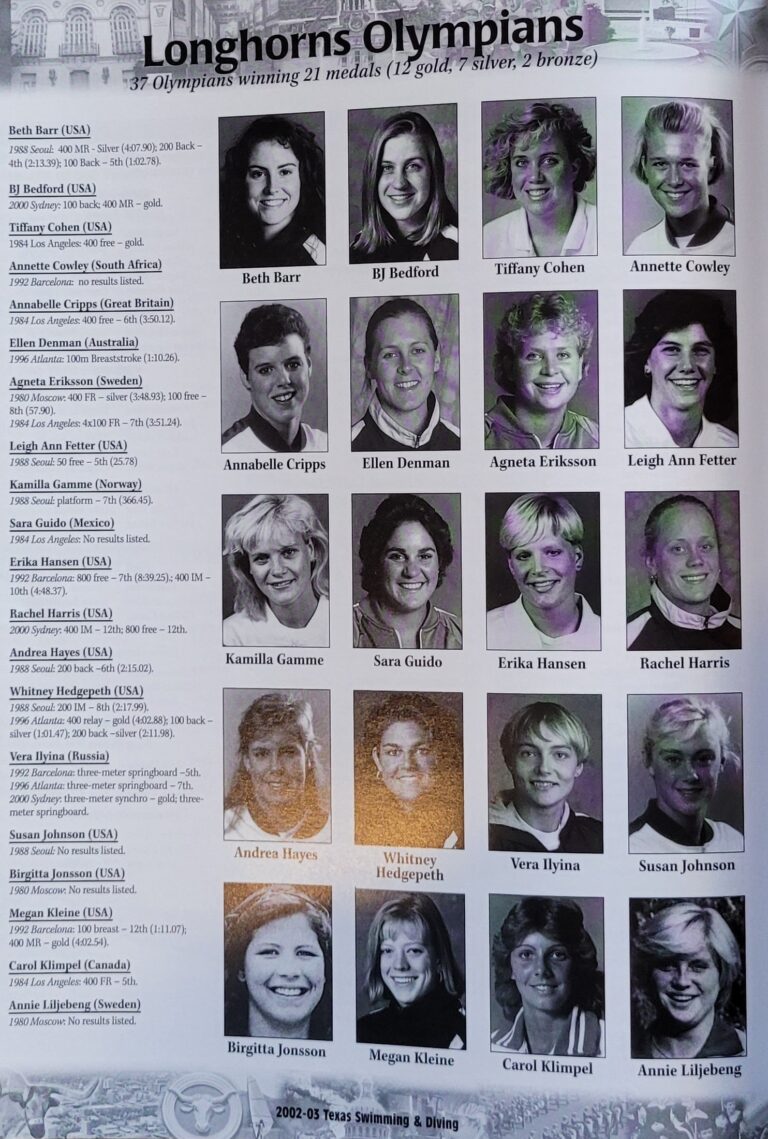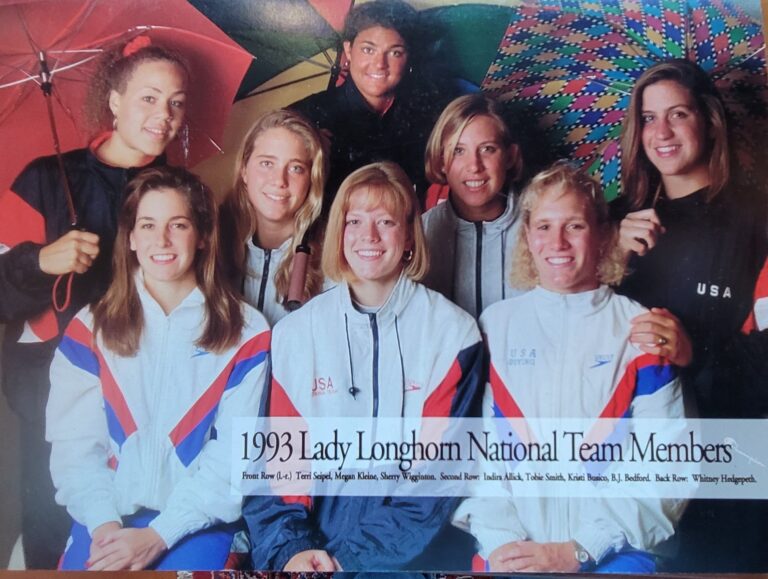Betsy Mitchell – swimming
BETSY MITCHELL is one of the first female athletes to benefit athletically from the Title IX law.
Mitchell’s college experience in the mid-to-late 1980s was right on the cusp of NCAA women’s swimming as we know it today. Mitchell’s first year of NCAA swimming was 1983-84, only a couple of years after the first NCAA Women’s Swimming and Diving National Championship.
Betsy Mitchell’s oral history podcast, written history, and a highlighted photo journal capture a life that has converted swimming disciplines, personal commitment, and the aspiration to excel into tools that she has used to build a life of character, fulfillment, productivity, and excellence.
Commitment to excellence in athletics was her conduit to a fulfilling life. Her book, “More than Medals,” reflects this belief. Swimming shaped her into the leader she is today, dedicated to forging paths for others to succeed.
Gallery Furniture owner Jim McIngvale proudly sponsors Betsy’s oral/history podcast. Horns Up! A link to Jim’s site is https://www.galleryfurniture.com/cart
Betsy’s podcast, photos, and written content are at the link https://texas-lsn.squarespace.com/betsy-mitchell-swimming
She was honored with the Honda Sports Award for Swimming and Diving, acknowledging her as the preeminent college female swimmer of the year in 1987–88. Her achievements also led to her induction into the Texas Longhorns Hall of Honor in 2000.
Furthermore, Mitchell earned the title of NCAA Swimmer of the Year for her exceptional performances at the Indiana University Natatorium.
As an athlete, Betsy understood before many that winning required dedication, discipline, goal-setting, and sacrifice. She knew that the holy grail of setting records in meets started by reaching goals in practice.
It may surprise you, but Olympic swimming is not at the top of Betsy’s most enjoyable moments as a swimmer. Her fondest memories are of age-group and collegiate swimming at the University of Texas.
Motivation to win comes in all forms.
Motivation for greatness always has an origin; for Betsy, that origin was Donna Lopiano. Donna and Betsy both refused to accept traditional norms in their formative years that barred girls from participating in certain “boys” sports leagues.
Mitchell’s advice to young women who want to go into coaching and sports administration is to “go for it” and find a good mentor — hers when she was starting her career, was Donna Lopiano, then the director of women’s athletics at Texas. Donna is now regarded as one of the most influential women in sports for her decades of work in gender equity.
Betsy says,
When I got to Texas, the athletic director there was Donna Lopiano, who was the major force along with Senator [Birch] Bayh of Indiana to get Title IX passed in our country in 1972. Donna is just a force of nature. She provided a great opportunity for young women. Betsy said that Donna “ was always pushing me to do more.” I thought, boy, I’d like to do that. And so I set out to be an athletic director.
I had a really positive growth experience as a coach and a teacher. That passion, that philosophy was there. She taught athletes that losing doesn’t mean you are a loser and winning does not mean you are a winner. She preached to her athletes that “the process is where you really become a person.
Donna Lopiano shares her story at https://www.texaslsn.org/donna-lopiano-2.
In the below video, Betsy Mitchell’s silver medal swim is at the mark 3:15-6:40
About coming in second in the Olympics , Betsy says,
One of the sources used by TLSN to tell Betsy Mitchel’s story is the book “Swimming: Character and Excellence”.
The Road to becoming a Longhorn
In 1984 Betsy Mitchell, swimming for North Carolina, had her first chance to see the Longhorn swimming program up close and personal and she was impressed. Betsy says,
Watching them from across the pool, I thought about how fun it would be to be a part of a team so obviously special. They were constantly doing cheers together, laughing and talking with one another. You never saw just one of them alone; they were always in groups supporting each other. I could see that they cared for one another and had the ability to pull together whether they won or not. That ability directly contributed to their ability to swim fast. Since one of my goals was to have fun while swimming, I felt transferring to Texas was a good move, although scary at the time.
Due to collegiate transfer rules, Betsy was red-shirted after transferring to Texas in 1984-1985. However, redshirting did not slow her down. She participated in national team trips and gained international experience.
During her red-shirt year, she had an epiphany, and her emphasis switched from swimming to win a race to swimming to beat the clock. At the U.S. Open in 1985, she set an American record in the 100—and 200-meter backstroke.
Betsy set her sights on greatness at Texas under Coach Quick. She changed her lifestyle to focus on discipline, swimming, nutrition, and education. She remembers, “The training was hard. But Texas set the table and allowed me to come into it.”
“My experience at Texas was awesome, transformative, and exciting. I was grateful to be there, there was high-quality competition in high-quality venues, and we were competing against the best swimmers in the country at an exciting time for the sport.” “I couldn’t have asked for more.”
“I felt a lot of pride swimming for Texas. I felt proud and happy just to have a spot on the team. At meet time, I knew I had a job and that my teammates counted on me to do my best. The extraordinary thing about our team at Texas was that my teammates never made me feel that winning or losing meets rested solely on my shoulders. I trained with two of the best backstrokers in the country, Debbie Risen and Tori Trees. When we were swimming for Texas, I can honestly say the order of finish did not matter to me- just that we scored the most possible points for the team. It was very freeing to concentrate on the good of some other entity, such as a team, and not just on myself.”
Coach Quick
A slide show of Longhorn swimming during the Betsy Mitchell era at Texas is below. Click on arrows to move back and forth to see all the photos.







Betsy understood that no matter where she placed in a race, individual achievement and personal best were her primary goals. She comments,
When you lose a race, the assumption seems to be that you are unhappy because someone beat you. When I lost a race, of course , I was unhappy because I didn’t swim the way I prepared ….”
but no one should ever be unhappy when they swim a personal best and lose.
Setting a World Record
Setting the World Record stands out as a cherished highlight in her swimming career. It represents one of the rare occasions when her extensive training and dedication fully manifested itself, culminating in the flawless execution of all she had strived to achieve.
A moment of Reflection
Betsy says,
I remember walking with the other finalists from the ready room to the blocks. Walking past my Texas teammates gave me the same shot of confidence. The announcer called us to the blocks. Then, it was very quiet. My next memories are very vivid memories of my thoughts during the race. I remember the race itself from two distinct perspectives. First, I remember feeling like a camera on the ceiling looking down on myself; I could see the increasing distance from the other competitor, and that inspired me to go faster. The other perspective was that of a bug riding on my forehead, looking back as I swam toward my goal. The difference between this race and others before was in the control my mind exerted over my actions during the race. My mind commanded my legs and hands to quicken the tempo of the stroke and exert more pressure against the water. The response was faster swimming and a world record. My Texas Coach Quick was there immediately, and his hug dragged me out of the pool. I waved at my Longhorn teammates and my parents.
Horns up for Betsy Mitchell- a Longhorn NCAA champion, world record holder, and Olympian gold medalist- who continues to help others set personal records as the Athletic Director at CalTech in Pasadena, California.






























